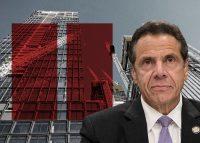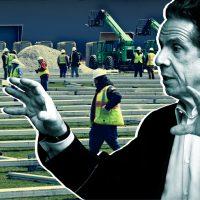The head of the New York Building Congress has a vision for how to bring America back from crisis.
Not surprisingly, it involves federal funding for construction and a focus on infrastructure. But Carlo Scissura, president and CEO of the trade group, also wants around-the-clock construction — which his hometown generally does not allow because of noise concerns.
“New York is a 24-hour city,” he said. “Why do we have to be a seven- or eight-hour construction city? I think we need to start having serious conversations about how we do shift work.”
Speaking on a TRD virtual panel discussion with Brad Meltzer, president of Plaza Construction, Scissura said the industry had worked hard to get “a large number” of projects deemed legal to continue during social distancing. He cited the complexity of shutting down a construction site. (In one of several changes, the Cuomo administration broadened its definition of essential construction.)
Plaza’s Meltzer said all his New York sites had shut down, but work continued in other areas, including New Jersey, where the rules are different.
Differing standards across the country — Plaza also operates in California, Florida and Maryland — makes it hard for companies to operate in any kind of uniform way during the pandemic, he said.
In Miami Beach, for example, companies are required to take the temperature of every worker before they come on site.
Read more



On top of the regulatory nuances, social distancing on construction sites also proved tricky.
“We have seen a productivity drop,” Meltzer said. “Let’s face it, it’s harder to get people in and out of a building, and when you have to maintain a certain distance, it’s much more complicated.” There were also issues with supplies and delivery delays, he added.
The firm has taken practical steps to reduce risk to its workers, including using machinery in place of people when possible — if two people are required to handle something heavy, for example.
Meltzer said despite the logistical issues, he has found some upsides, too, including virtual meetings.
“It used to be more difficult to get people to a meeting, and now we’re meeting constantly,” he said. “Is it more complicated? Absolutely. But it’s manageable, and it just takes focus.”
Despite the industry’s adjustment to a new way of doing things, Scissura said many builders were itching to get back to work. He called on the government to give the industry a timeline, which would allow people to start making plans.
Asked about New York City’s Local Law 196, which imposes site-safety measures that many in the industry consider burdensome and ineffective, Scissura kept his comments short, saying only, “The Department of Buildings will have to make some decisions in the very near future.”
His implication — on the heels of his call for round-the-clock construction, which would surely be opposed by quiet-loving community groups — seemed to be that the law should be enforced in a way that facilitates the industry’s recovery, which he said was key to getting the economy going.
“I think everything is on the table,” Scissura said.
Write to Sylvia Varnham O’Regan at so@therealdeal.com